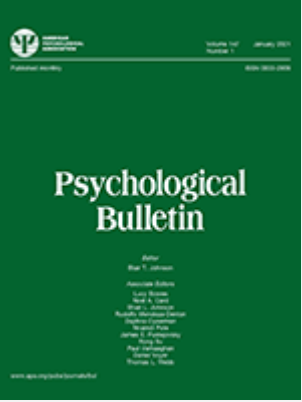创造力培训对创造性表现的影响:对五十年创造力培训研究的元分析回顾和批判性评估。
IF 17.3
1区 心理学
Q1 PSYCHOLOGY
引用次数: 0
摘要
创造力被广泛认为是在现代社会取得成功的一项基本技能。创造力培训项目层出不穷,一些荟萃分析试图总结这些项目的有效性,并确定影响其效果的特征。遗憾的是,以往的荟萃分析都存在一些局限性,最明显的是忽略了发表偏差的潜在影响以及研究质量对效应大小的影响。我们对 5 个年代的 169 项创造力培训研究进行了荟萃分析(844 个效应大小,是迄今为止对创造力培训进行的最大规模荟萃分析),其中包括大量未发表的研究(48 项研究;262 个效应大小)。我们采用了一系列统计方法来检测和调整发表偏差,并评估了该领域证据的稳健性。与之前的荟萃分析一致,我们发现了中等程度的培训效果(0.53 SDs;未调整发表偏差)。重要的是,我们观察到了与强烈发表偏倚一致的趋同证据。所有调整方法都大大降低了我们的原始估计值(调整后的估计值从 0.29 到 0.32 SDs 不等)。这种严重的偏倚使我们对该领域已发表文献的代表性以及以往荟萃分析的结论产生了怀疑。我们的分析还揭示了创造力培训研究中普遍存在的方法缺陷(很可能夸大了我们的平均效果),而且随着时间的推移,几乎没有方法改进的迹象--这种情况限制了这一研究成果的实用性。最后,我们提出了对研究人员和从业人员的启示和建议,并提出了未来研究的议程。(PsycInfo Database Record (c) 2024 APA, 版权所有)。本文章由计算机程序翻译,如有差异,请以英文原文为准。
The impact of creativity training on creative performance: A meta-analytic review and critical evaluation of 5 decades of creativity training studies.
Creativity is widely considered a skill essential to succeeding in the modern world. Numerous creativity training programs have been developed, and several meta-analyses have attempted to summarize the effectiveness of these programs and identify the features influencing their impact. Unfortunately, previous meta-analyses share a number of limitations, most notably overlooking the potentially strong impact of publication bias and the influence of study quality on effect sizes. We undertook a meta-analysis of 169 creativity training studies across 5 decades (844 effect sizes, the largest meta-analysis of creativity training to date), including a substantial number of unpublished studies (48 studies; 262 effect sizes). We employed a range of statistical methods to detect and adjust for publication bias and evaluated the robustness of the evidence in the field. In line with previous meta-analyses, we found a moderate training effect (0.53 SDs; unadjusted for publication bias). Critically, we observed converging evidence consistent with strong publication bias. All adjustment methods considerably lowered our original estimate (adjusted estimates ranged from 0.29 to 0.32 SDs). This severe bias casts doubt on the representativeness of the published literature in the field and on the conclusions of previous meta-analyses. Our analysis also revealed a high prevalence of methodological shortcomings in creativity training studies (likely to have inflated our average effect), and little signs of methodological improvement over time-a situation that limits the usefulness of this body of work. We conclude by presenting implications and recommendations for researchers and practitioners, and we propose an agenda for future research. (PsycInfo Database Record (c) 2024 APA, all rights reserved).
求助全文
通过发布文献求助,成功后即可免费获取论文全文。
去求助
来源期刊

Psychological bulletin
医学-心理学
CiteScore
33.60
自引率
0.90%
发文量
21
期刊介绍:
Psychological Bulletin publishes syntheses of research in scientific psychology. Research syntheses seek to summarize past research by drawing overall conclusions from many separate investigations that address related or identical hypotheses.
A research synthesis typically presents the authors' assessments:
-of the state of knowledge concerning the relations of interest;
-of critical assessments of the strengths and weaknesses in past research;
-of important issues that research has left unresolved, thereby directing future research so it can yield a maximum amount of new information.
 求助内容:
求助内容: 应助结果提醒方式:
应助结果提醒方式:


